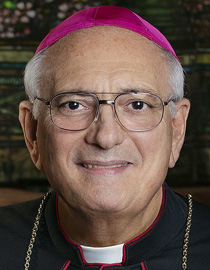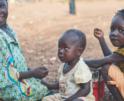
Faith

Migrants are particularly vulnerable to trafficking because, in their desperation, they may resort to paying a smuggler to arrange transportation to their destination.

DiMarzio
January was National Slavery and Human Trafficking Prevention Month, leading up to the Feb. 8 feast of St. Josephine Bakhita. St. Josephine Bakhita was a young southern Sudanese girl who was kidnapped and sold into slavery. She eventually was bought by an Italian diplomat and taken to Venice, where she encountered the Catholic faith.
Her story is an interesting one, since escaping from slavery was not an easy task even in Italy during the 19th century, yet Josephine persevered and became a Canossian sister. She was canonized by St. John Paul II, who in his homily said, "We find a shining advocate of genuine emancipation." Josephine has become the patron saint of those enslaved and trafficked, as well as one venerated by African American Catholics in the United States and also the patron saint of Sudan.
Human trafficking, often referred to as a modern form of slavery, involves using force, fraud, or coercion to make someone provide labor or engage in sexual activities against their will. Migrants are particularly vulnerable to trafficking because, in their desperation, they may resort to paying a smuggler to arrange transportation to their destination.
Exploiting this vulnerability, smugglers may then traffic migrants for labor or sex. The hazards migrants encounter during their difficult journeys can expose them to trafficking, regardless of whether they have used a smuggler before.
Even though those who are smuggled might initially consent and pay a fee for transportation to their desired country, some soon find themselves recruited or lured into situations of sexual exploitation, forced labor, or indentured servitude -- whether it happens before, during, or after their migration journey. Trafficked individuals are frequently deceived with promises of a good job and a better life or, like St. Bakhita, kidnapped.
Awareness of the problem is a critical tool to combat the crime of human trafficking, which is a worldwide problem. Due to the underreported nature of the crime, it is difficult to gather accurate statistics of those trafficked and exploited. Nevertheless, the Global Slavery Index reports that at any given moment there are nearly 50 million people living in a situation of modern slavery. Estimates show there are about 1 million people living in situations of slavery in the United States.
The bimonthly newsletter put out by the anti-trafficking office of the U.S. bishops' conference titled "Hidden in Plain Sight," highlights how often we fail to see trafficking situations in our own communities. Hidden in plain sight is the best way to describe this reality, as they are sometimes hidden in nail salons, massage parlors, or in sectors of the entertainment industry.
Awareness, prevention and detection are effective tools to eliminate human trafficking from our midst. How important it is that we keep watch for any signs of those who may be ill-treated in their workplaces, understand what might constitute a human trafficking situation and then report it to the proper authorities who can then intervene.
It is admirable that many female religious orders have dedicated much of their resources, both personnel and financial, to combating this terrible scourge on our world society. Most of those trafficked are women, but young and middle-aged men are among those trafficked.
A Prayer to St. Josephine Bakhita
St. Josephine Bakhita, you were sold into slavery as a child and endured untold hardship and suffering.
Once liberated from your physical enslavement, you found proper redemption in your encounter with Christ and his Church.
O, St. Bakhita, assist all those trapped in a state of slavery; Intercede with God on their behalf so that they will be released from their chains of captivity. Those whom man enslaves, let God set free.
Provide comfort to survivors of slavery and let them look to you as an example of hope and faith. Help all survivors find healing from their wounds. We ask for your prayers and intercessions for those enslaved among us. Amen.
- Bishop Nicholas DiMarzio is retired bishop of the Diocese of Brooklyn, N.Y. He writes the column "Walking With Migrants" for Catholic News Service and The Tablet.
Recent articles in the Faith & Family section
-
The Christmas crecheFather Robert M. O'Grady
-
Feeling like ChristmasJaymie Stuart Wolfe
-
Parish priests and their peopleMsgr. Frank Kelley
-
Be the carolArchbishop Richard G. Henning
-
Give a Christmas Gift to the MissionsMaureen Crowley Heil


















